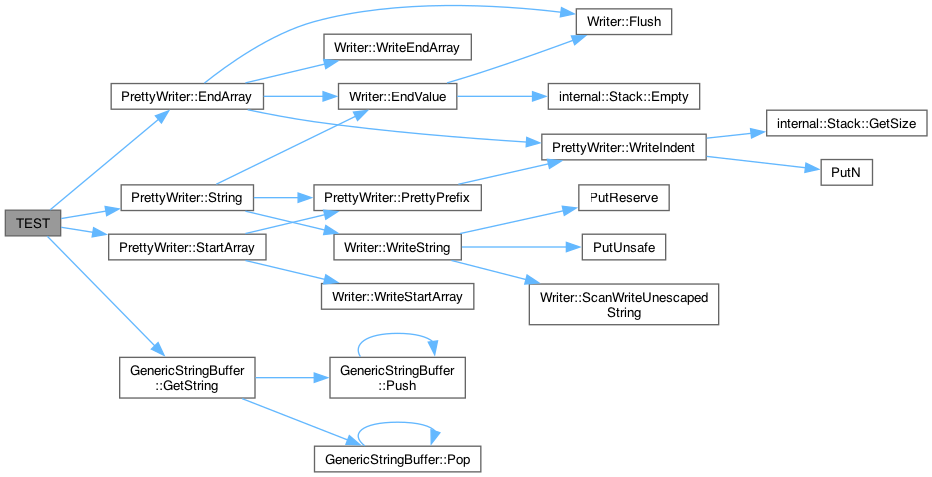Loading...
Searching...
No Matches
#include "unittest.h"#include "rapidjson/reader.h"#include "rapidjson/prettywriter.h"#include "rapidjson/stringbuffer.h"#include "rapidjson/filewritestream.h"#include <sstream>
Include dependency graph for prettywritertest.cpp:

Go to the source code of this file.
Classes | |
| class | OStreamWrapper |
Macros | |
| #define | T(meth, val, expected) |
Functions | |
| TEST (PrettyWriter, Basic) | |
| TEST (PrettyWriter, FormatOptions) | |
| TEST (PrettyWriter, SetIndent) | |
| TEST (PrettyWriter, String) | |
| TEST (PrettyWriter, OStreamWrapper) | |
| TEST (PrettyWriter, FileWriteStream) | |
| TEST (PrettyWriter, RawValue) | |
| TEST (PrettyWriter, InvalidEventSequence) | |
| TEST (PrettyWriter, NaN) | |
| TEST (PrettyWriter, Inf) | |
| TEST (PrettyWriter, Issue_889) | |
| TEST (PrettyWriter, Issue_1336) | |
Macro Definition Documentation
◆ T
| #define T | ( | meth, | |
| val, | |||
| expected ) |
Value:
{ \
StringBuffer buffer; \
PrettyWriter<StringBuffer> writer(buffer); \
writer.meth(val); \
\
EXPECT_STREQ(expected, buffer.GetString()); \
EXPECT_TRUE(writer.IsComplete()); \
}
Function Documentation
◆ TEST() [1/12]
| TEST | ( | PrettyWriter | , |
| Basic | ) |
Definition at line 60 of file prettywritertest.cpp.
60 {
61 StringBuffer buffer;
62 PrettyWriter<StringBuffer> writer(buffer);
63 Reader reader;
67}
Here is the call graph for this function:

◆ TEST() [2/12]
| TEST | ( | PrettyWriter | , |
| FileWriteStream | ) |
Definition at line 167 of file prettywritertest.cpp.
167 {
168 char filename[L_tmpnam];
169 FILE* fp = TempFile(filename);
170 ASSERT_TRUE(fp!=NULL);
171 char buffer[16];
174 Reader reader;
177 fclose(fp);
178
179 fp = fopen(filename, "rb");
180 fseek(fp, 0, SEEK_END);
181 size_t size = static_cast<size_t>(ftell(fp));
182 fseek(fp, 0, SEEK_SET);
183 char* json = static_cast<char*>(malloc(size + 1));
184 size_t readLength = fread(json, 1, size, fp);
185 json[readLength] = '\0';
186 fclose(fp);
187 remove(filename);
188 EXPECT_STREQ(kPrettyJson, json);
189 free(json);
190}
Here is the call graph for this function:

◆ TEST() [3/12]
| TEST | ( | PrettyWriter | , |
| FormatOptions | ) |
Definition at line 69 of file prettywritertest.cpp.
69 {
70 StringBuffer buffer;
71 PrettyWriter<StringBuffer> writer(buffer);
72 writer.SetFormatOptions(kFormatSingleLineArray);
73 Reader reader;
77}
Here is the call graph for this function:
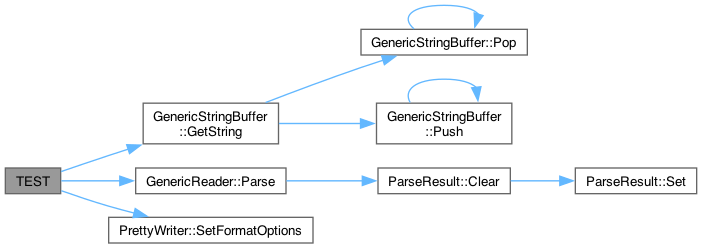
◆ TEST() [4/12]
| TEST | ( | PrettyWriter | , |
| Inf | ) |
Definition at line 281 of file prettywritertest.cpp.
281 {
282 double inf = std::numeric_limits<double>::infinity();
283
285 StringBuffer buffer;
286 {
287 PrettyWriter<StringBuffer> writer(buffer);
288 EXPECT_FALSE(writer.Double(inf));
289 }
290 {
291 PrettyWriter<StringBuffer> writer(buffer);
292 EXPECT_FALSE(writer.Double(-inf));
293 }
294 {
296 EXPECT_TRUE(writer.Double(inf));
297 }
298 {
300 EXPECT_TRUE(writer.Double(-inf));
301 }
303}
Definition ieee754.h:23
Here is the call graph for this function:

◆ TEST() [5/12]
| TEST | ( | PrettyWriter | , |
| InvalidEventSequence | ) |
Definition at line 211 of file prettywritertest.cpp.
211 {
212 // {]
213 {
214 StringBuffer buffer;
215 PrettyWriter<StringBuffer> writer(buffer);
216 writer.StartObject();
218 EXPECT_FALSE(writer.IsComplete());
219 }
220
221 // [}
222 {
223 StringBuffer buffer;
224 PrettyWriter<StringBuffer> writer(buffer);
225 writer.StartArray();
227 EXPECT_FALSE(writer.IsComplete());
228 }
229
230 // { 1:
231 {
232 StringBuffer buffer;
233 PrettyWriter<StringBuffer> writer(buffer);
234 writer.StartObject();
236 EXPECT_FALSE(writer.IsComplete());
237 }
238
239 // { 'a' }
240 {
241 StringBuffer buffer;
242 PrettyWriter<StringBuffer> writer(buffer);
243 writer.StartObject();
244 writer.Key("a");
246 EXPECT_FALSE(writer.IsComplete());
247 }
248
249 // { 'a':'b','c' }
250 {
251 StringBuffer buffer;
252 PrettyWriter<StringBuffer> writer(buffer);
253 writer.StartObject();
254 writer.Key("a");
255 writer.String("b");
256 writer.Key("c");
258 EXPECT_FALSE(writer.IsComplete());
259 }
260}
Definition unittest.h:109
Here is the call graph for this function:
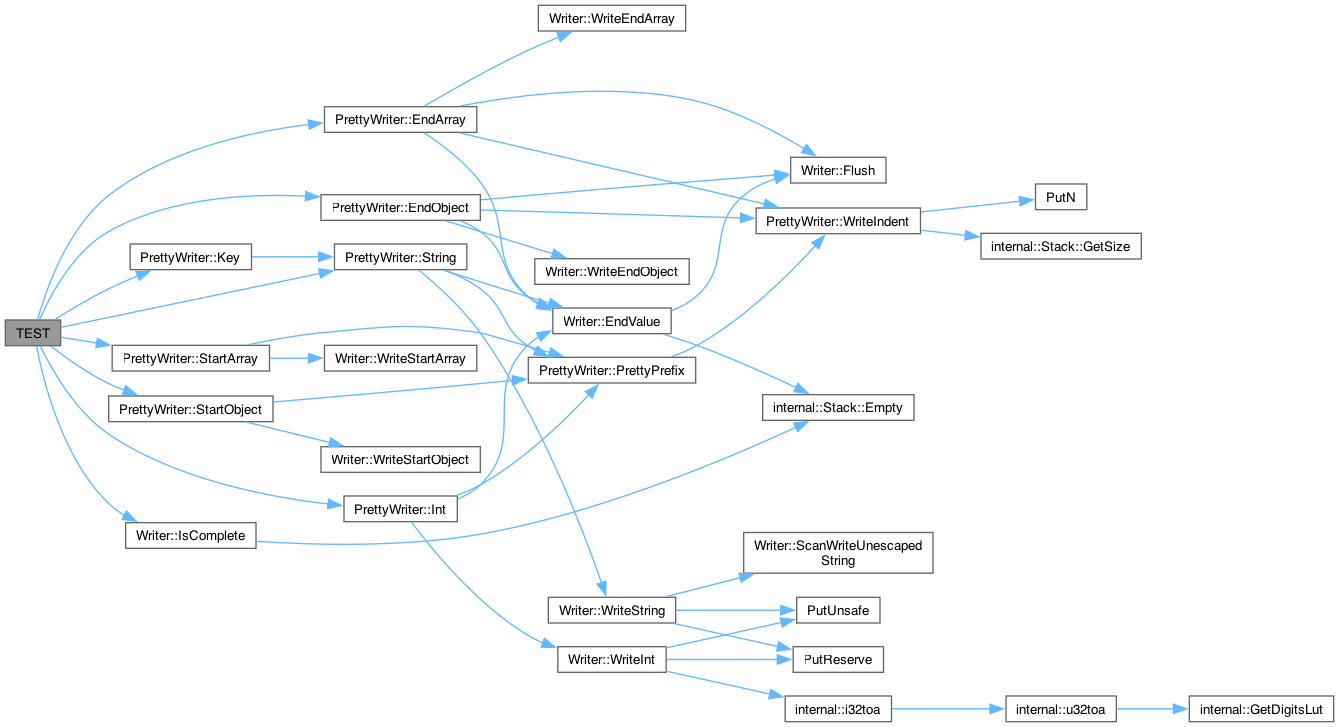
◆ TEST() [6/12]
| TEST | ( | PrettyWriter | , |
| Issue_1336 | ) |
Definition at line 342 of file prettywritertest.cpp.
342 {
343#define T(meth, val, expected) \
344 { \
345 StringBuffer buffer; \
346 PrettyWriter<StringBuffer> writer(buffer); \
347 writer.meth(val); \
348 \
349 EXPECT_STREQ(expected, buffer.GetString()); \
350 EXPECT_TRUE(writer.IsComplete()); \
351 }
352
361#undef T
362
363 StringBuffer buffer;
364 PrettyWriter<StringBuffer> writer(buffer);
365 writer.Null();
366
368 EXPECT_TRUE(writer.IsComplete());
369}
#define T(meth, val, expected)
Definition gtest_pred_impl_unittest.cc:56
Here is the call graph for this function:
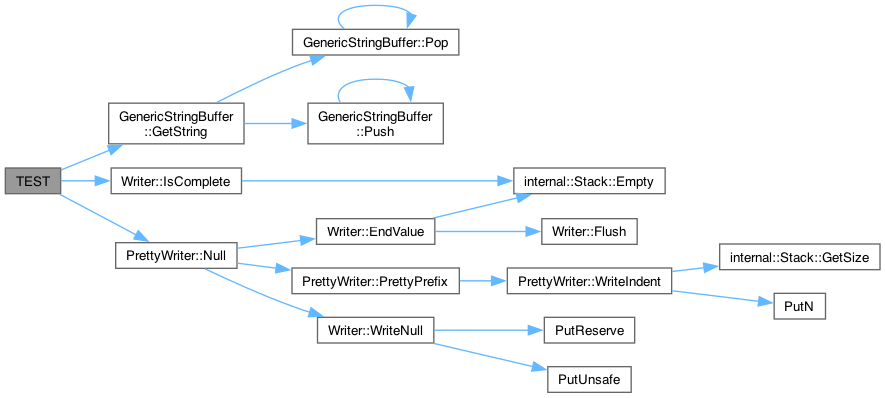
◆ TEST() [7/12]
| TEST | ( | PrettyWriter | , |
| Issue_889 | ) |
Definition at line 305 of file prettywritertest.cpp.
305 {
307
308 StringBuffer buffer;
309 PrettyWriter<StringBuffer> writer(buffer);
310 writer.StartArray();
311 writer.String(buf);
312 writer.EndArray();
313
315 EXPECT_TRUE(writer.IsComplete()); \
316}
Here is the call graph for this function:
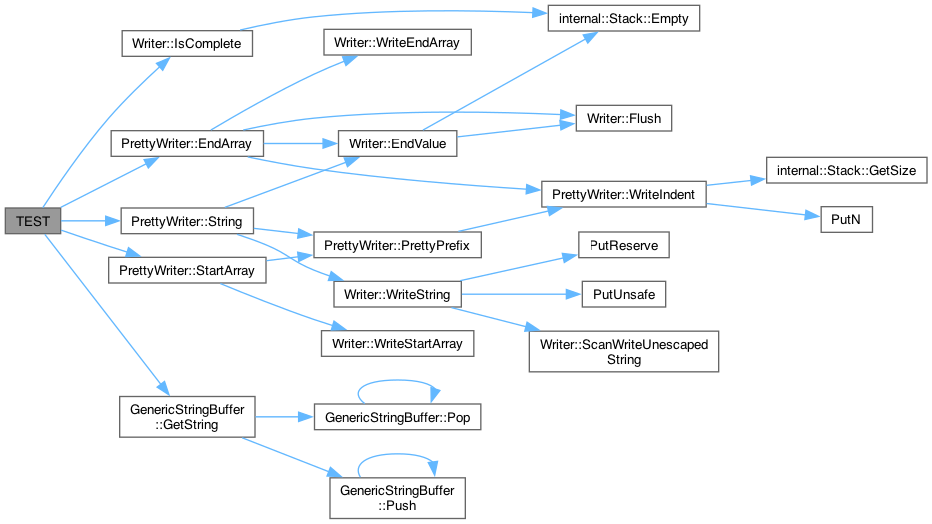
◆ TEST() [8/12]
| TEST | ( | PrettyWriter | , |
| NaN | ) |
Definition at line 262 of file prettywritertest.cpp.
262 {
263 double nan = std::numeric_limits<double>::quiet_NaN();
264
266 StringBuffer buffer;
267 {
268 PrettyWriter<StringBuffer> writer(buffer);
269 EXPECT_FALSE(writer.Double(nan));
270 }
271 {
273 EXPECT_TRUE(writer.Double(nan));
275 }
276 GenericStringBuffer<UTF16<> > buffer2;
277 PrettyWriter<GenericStringBuffer<UTF16<> > > writer2(buffer2);
278 EXPECT_FALSE(writer2.Double(nan));
279}
Here is the call graph for this function:

◆ TEST() [9/12]
| TEST | ( | PrettyWriter | , |
| OStreamWrapper | ) |
Definition at line 151 of file prettywritertest.cpp.
151 {
153
154 std::stringstream ss;
156
158
159 Reader reader;
161
162 std::string actual = ss.str();
163 EXPECT_STREQ(kPrettyJson, actual.c_str());
164}
Definition prettywritertest.cpp:128
static const Segment ss(Segment::ss)
Here is the call graph for this function:

◆ TEST() [10/12]
| TEST | ( | PrettyWriter | , |
| RawValue | ) |
Definition at line 192 of file prettywritertest.cpp.
192 {
193 StringBuffer buffer;
194 PrettyWriter<StringBuffer> writer(buffer);
195 writer.StartObject();
196 writer.Key("a");
197 writer.Int(1);
198 writer.Key("raw");
199 const char json[] = "[\"Hello\\nWorld\", 123.456]";
200 writer.RawValue(json, strlen(json), kArrayType);
201 writer.EndObject();
202 EXPECT_TRUE(writer.IsComplete());
203 EXPECT_STREQ(
204 "{\n"
205 " \"a\": 1,\n"
206 " \"raw\": [\"Hello\\nWorld\", 123.456]\n" // no indentation within raw value
207 "}",
208 buffer.GetString());
209}
Here is the call graph for this function:
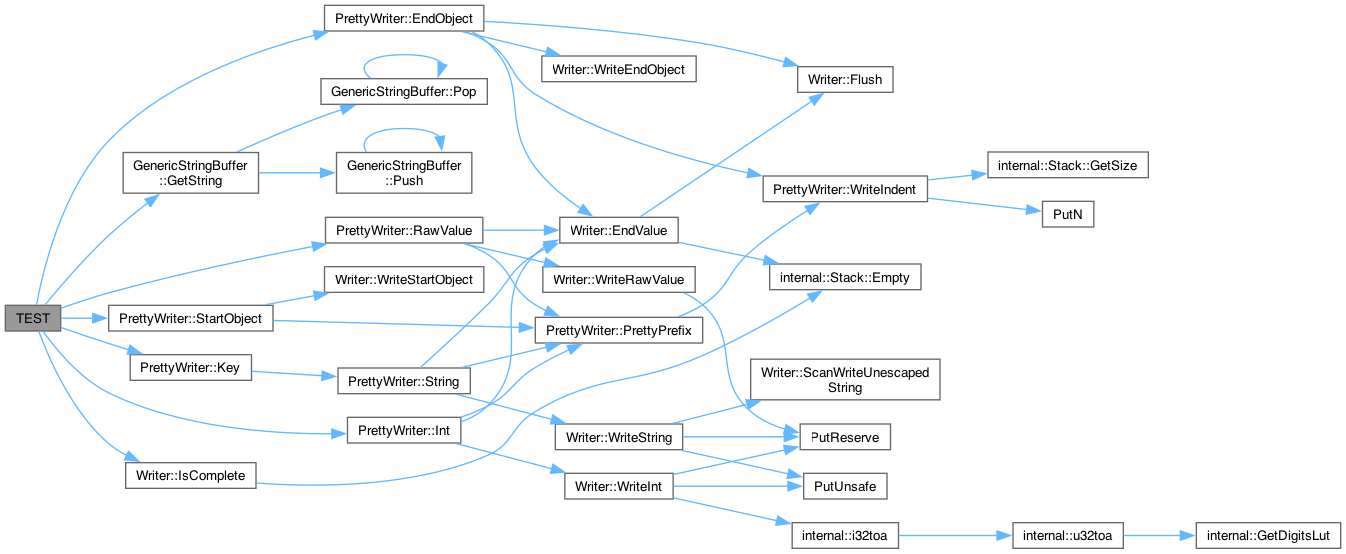
◆ TEST() [11/12]
| TEST | ( | PrettyWriter | , |
| SetIndent | ) |
Definition at line 79 of file prettywritertest.cpp.
79 {
80 StringBuffer buffer;
81 PrettyWriter<StringBuffer> writer(buffer);
82 writer.SetIndent('\t', 1);
83 Reader reader;
86 EXPECT_STREQ(
87 "{\n"
88 "\t\"hello\": \"world\",\n"
89 "\t\"t\": true,\n"
90 "\t\"f\": false,\n"
91 "\t\"n\": null,\n"
92 "\t\"i\": 123,\n"
93 "\t\"pi\": 3.1416,\n"
94 "\t\"a\": [\n"
95 "\t\t1,\n"
96 "\t\t2,\n"
97 "\t\t3,\n"
98 "\t\t-1\n"
99 "\t],\n"
100 "\t\"u64\": 1234567890123456789,\n"
101 "\t\"i64\": -1234567890123456789\n"
102 "}",
103 buffer.GetString());
104}
Here is the call graph for this function:
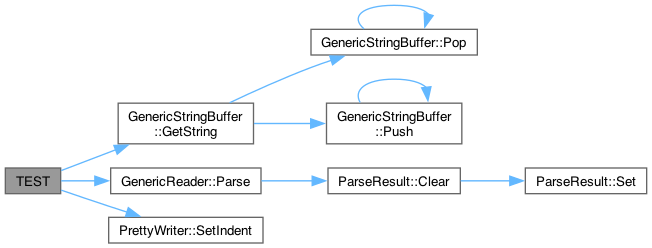
◆ TEST() [12/12]
| TEST | ( | PrettyWriter | , |
| String | ) |
Definition at line 106 of file prettywritertest.cpp.
106 {
107 StringBuffer buffer;
108 PrettyWriter<StringBuffer> writer(buffer);
109 EXPECT_TRUE(writer.StartArray());
111 EXPECT_TRUE(writer.EndArray());
113}
Here is the call graph for this function:
